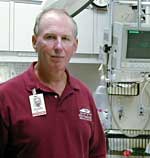Local hospitals examine emergency preparedness
By Tom Scheck
Minnesota Public Radio
September 18, 2001
Emergency room physicians say hospitals throughout the state are re-examining their emergency plans after last week's terrorist attacks. Doctors say a large patient load like those seen on the East Coast could stretch their resources. Hospital officials also say they need to increase their planning to prepare for other types of disasters, especially a bioterrorist attack.
EMERGENCY ROOM DOCTORS AT TWO OF THE TOP TWIN CITIES TRAUMA CENTERS say they'll be able to handle any disaster, up to a point. North Memorial Medical Center's Pat Lilja says a large number of severe injuries could have a dramatic impact on hospitals throughout the state.
"If you have 70 or 80 people with severe burns, then we don't have enough burn beds in Minnesota to care for them," Lilja says. "If we have 500 people with shrapnel type wounds - cuts, abrasions, etc., then we can handle it. The mix and type of patients will really have to depend on how our hospitals will gear up."
Lilja says emergency medical personnel and hospital officials are prepared to initiate their required response plans once a disaster strikes. He says in any disaster, communication among emergency personnel and hospitals will be critical. The seriously injured would need to be shuttled to the closest hospitals, while those suffering minor injuries would be moved to hospitals farther away from the incident.
"It's very difficult to know what's going to stretch us. If we have a bunch of patients needing operating rooms and you only have so many operating rooms, that may be a problem. The other problem we know we'll have is that we have hospitals that are already full of patients," says Lilja.
And that's why it's important for hospitals to communicate their bed availability, according to Dr. John Hick, who works in the Hennepin County Medical Center's emergency room. Hick says if there's a large-scale disaster, many hospitals would have to move their existing patients to make room for patients with serious injuries. He says makeshift rooms would have to be created to help people who aren't severely injured.
"We're running so tight on intensive care and burn beds in the Twin Cities that if we did have a disaster right now, we would have to do some major overhaul to get patients out," says Hick. "And in doing so, there's the potential for patients dying that could have been saved if we had more physical resources."
On a scale of one to 10, Hick says he'd rate the readiness of the health care community as a five. He says it's impossible for hospitals to reach a 10, since they can't prepare for everything. He says he'd be happy if hospitals could get their preparedness up to a seven.
But while Hick says the health community is relatively prepared for natural disasters, explosions and plane crashes, he says they need to be better prepared for a biological outbreak.
Michael Osterholm, the director of the University of Minnesota's Center for Infectious Disease Research and Policy, says the nation is ill-prepared for a biological outbreak.
"We're a country right now that when we have a slight increase in influenza increases in the wintertime we close our hospitals, because we dont' have excess bed capacity. You tell me what it means if hundreds of thousands of people come down with smallpox or anthrax."
Osterholm says if a terrorist did release a biological agent into a city, it would potentially cripple the public health system. He says the nation has a limited amount of antibiotics and vaccines to treat any bio outbreak. He says the federal government needs to move beyond policing the nation's borders and skies, and invest in public health.
"We run much of the public health community on what I would call the equivalent of running O'Hare's air tower on tin cans and strings," Osterholm warns. "Yet that's going to be the system that will respond to a bioterrorism release this time."
Osterholm says if Congress would earmark hundreds of millions - or billions - of dollars to prepare for a biological outbreak, it would take years to get the vaccines and antibiotics produced. He says Minnesota's health department, where he used to work as state epidemiologist, is one of the finest in the country and would be able to react to an outbreak. But he says the response would have to be just as rapid as the reaction by the emergency workers who rush to the scene of any other disaster.
More Information
North Memorial Medical Center
Hennepin County Medical Center
By Tom Scheck
Minnesota Public Radio
September 18, 2001
|
|
RealAudio |
Emergency room physicians say hospitals throughout the state are re-examining their emergency plans after last week's terrorist attacks. Doctors say a large patient load like those seen on the East Coast could stretch their resources. Hospital officials also say they need to increase their planning to prepare for other types of disasters, especially a bioterrorist attack.
| |
|
|
|
||
EMERGENCY ROOM DOCTORS AT TWO OF THE TOP TWIN CITIES TRAUMA CENTERS say they'll be able to handle any disaster, up to a point. North Memorial Medical Center's Pat Lilja says a large number of severe injuries could have a dramatic impact on hospitals throughout the state.
"If you have 70 or 80 people with severe burns, then we don't have enough burn beds in Minnesota to care for them," Lilja says. "If we have 500 people with shrapnel type wounds - cuts, abrasions, etc., then we can handle it. The mix and type of patients will really have to depend on how our hospitals will gear up."
Lilja says emergency medical personnel and hospital officials are prepared to initiate their required response plans once a disaster strikes. He says in any disaster, communication among emergency personnel and hospitals will be critical. The seriously injured would need to be shuttled to the closest hospitals, while those suffering minor injuries would be moved to hospitals farther away from the incident.
"It's very difficult to know what's going to stretch us. If we have a bunch of patients needing operating rooms and you only have so many operating rooms, that may be a problem. The other problem we know we'll have is that we have hospitals that are already full of patients," says Lilja.
And that's why it's important for hospitals to communicate their bed availability, according to Dr. John Hick, who works in the Hennepin County Medical Center's emergency room. Hick says if there's a large-scale disaster, many hospitals would have to move their existing patients to make room for patients with serious injuries. He says makeshift rooms would have to be created to help people who aren't severely injured.
"We're running so tight on intensive care and burn beds in the Twin Cities that if we did have a disaster right now, we would have to do some major overhaul to get patients out," says Hick. "And in doing so, there's the potential for patients dying that could have been saved if we had more physical resources."
| |
|
|
|
||
But while Hick says the health community is relatively prepared for natural disasters, explosions and plane crashes, he says they need to be better prepared for a biological outbreak.
Michael Osterholm, the director of the University of Minnesota's Center for Infectious Disease Research and Policy, says the nation is ill-prepared for a biological outbreak.
"We're a country right now that when we have a slight increase in influenza increases in the wintertime we close our hospitals, because we dont' have excess bed capacity. You tell me what it means if hundreds of thousands of people come down with smallpox or anthrax."
Osterholm says if a terrorist did release a biological agent into a city, it would potentially cripple the public health system. He says the nation has a limited amount of antibiotics and vaccines to treat any bio outbreak. He says the federal government needs to move beyond policing the nation's borders and skies, and invest in public health.
"We run much of the public health community on what I would call the equivalent of running O'Hare's air tower on tin cans and strings," Osterholm warns. "Yet that's going to be the system that will respond to a bioterrorism release this time."
Osterholm says if Congress would earmark hundreds of millions - or billions - of dollars to prepare for a biological outbreak, it would take years to get the vaccines and antibiotics produced. He says Minnesota's health department, where he used to work as state epidemiologist, is one of the finest in the country and would be able to react to an outbreak. But he says the response would have to be just as rapid as the reaction by the emergency workers who rush to the scene of any other disaster.
More Information


